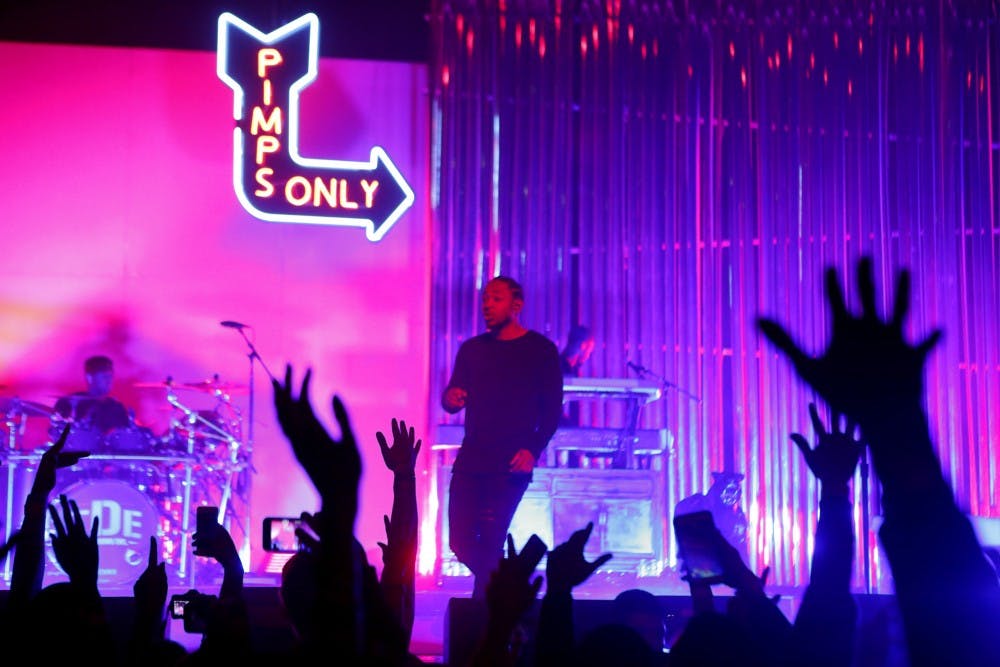There undeniably has been tension between the Black community and law enforcement for some time now, but even more so in the last four years.
In 2012, a group of outraged activists pioneered the #BlackLivesMatter movement after teenager Trayvon Martin was shot by neighborhood watch coordinator, George Zimmerman.
According to its website, the purpose of the #BlackLivesMatter movement is to "(re)build the Black liberation movement." Because this is a digital age, the movement has been very social media-driven. The hashtag can be found across the expanse of the internet.
The presence of police brutality against Black people and the absence of consequence for the officers in those cases has caused dangerous tension. This discord has been present, not only in the lives of Black people, but in hip-hop as well.
Music is meant to be expressive and since the 80s, hip-hop and rap artists such as N.W.A, Tupac Shakur and Kendrick Lamar, have made music expressing their feelings toward race relations and the mistreatment of Black people in the U.S.
Hip-hop is popular within the Black community, among others. Music that speaks on these controversial issues can bring awareness to not only Black people, but to all people.
This is also the purpose of the #BlackLivesMatter movement: to raise awareness. Therefore, it is important for artists to speak up on the issues that the Black community is facing.
The music that hip-hop and rap artists make, as well as the things they say and do, has a great influence on their listeners, whether they realize it or not.
Rapper J. Cole has been very active and vocal when it comes to the #BlackLivesMatter movement. In 2014, Cole marched in Ferguson, MO with protesters after the killing of Michael Brown by police.
Before agreeing to do an interview with Complex News, Cole spent his time talking and marching with protestors and completely avoiding the media. He wasn't there to publicize himself, he was there in solidarity.
I am a Cole fan, and the fact that he took the time to be with protestors with no desire to be acknowledged by the press spoke volumes to me. I wanted to be there, not only because he was there, but because I wanted to take a stand with him and the other protestors.
I spoke to Chancellor Johnson, also known as Dj Onemorechance on ASU's Blaze Radio about whether or not hip-hop artists should speak out on these issues.
“It depends on who the artist is,” Johnson said. “If somebody like Chief Keef comes out and talks about ‘Black lives matter,' no one’s going to take him seriously. And when it comes to rappers like J. Cole, Chance the Rapper and Kendrick Lamar who are known to do it, people listen, but they always do this so it’s nothing new. They would really have to do something different.”
Kendrick Lamar @ 2016 Grammy Awards from Sofia Payro on Vimeo.
However, if artists like Chief Keef and Future, who are known to make music that is more hardcore, were to publicly say "Black lives matter,” it would matter. Just because not everyone takes them seriously, doesn't mean no one will take them seriously.
Artists just mentioning “Black lives matter” can bring so much more attention to the movement, simply because someone of in the spotlight mentioned it.
There are also artists, such as Young Thug and A$AP Rocky, that do not feel they need to speak on these issues, simply because it does not affect them directly. Although artists may not be directly affected, this type of attitude discredits the movement instead of helping it.
If a listener hears the Black men that they idolize, like A$AP Rocky, saying that #BlackLivesMatter doesn’t affect them, it gives listeners permission to be complacent.
An artist does not have to feel as strongly about the movement as the official members, but their acknowledgment can go a long way.
“I think that artists should make music about these issues. The goal of #BlackLivesMatter is to bring awareness to the world,” said Katt McKinney, organizer of the #BlackLivesMatter group in Phoenix. “It’s good (for artists) to be vocal, but they need to take responsibility. We don’t need any hypocrites.”
McKinney is right: artists need to take responsibility for the things that they say and do.
Just talking about the issues goes without merit unless there is some course of action.
Reach the columnist at bmmoore8@asu.edu or follow @MooreBrianna97 on Twitter.
Like The State Press on Facebook and follow @statepress on Twitter.
Editor’s note: The opinions presented in this column are the author’s and do not imply any endorsement from The State Press or its editors.
Want to join the conversation? Send an email to opiniondesk.statepress@gmail.com. Keep letters under 300 words and be sure to include your university affiliation. Anonymity will not be granted.




